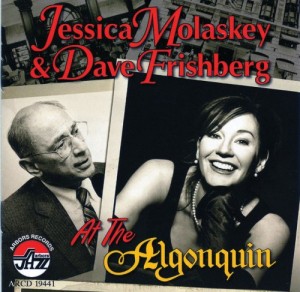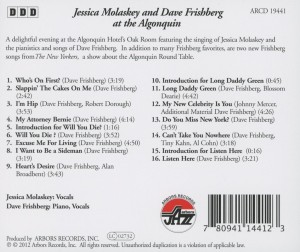Artist Name = Jessica Molaskey and Dave Frishberg
Genre = Jazz
Title = At The Algonquin
Record Company = Arbors
Though singer Jessica Molaskey receives top billing on this CD, her presence is unnecessary except on “Who’s on First?,” which requires two singers, and “Excuse Me for Living,” which must be sung by a woman. Dave Frishberg generously included her at this engagement, as he featured Rebecca Kilgore at other sessions. The CD belongs to him: he either wrote or collaborated on all the songs, sings on most of them, and plays piano on all of them.
One knows what to expect from Frishberg’s most appealing work: witty narratives with hip lyrics and engaging rhymes sung with a nasal voice to the composer’s own accompaniment. The narratives are the star. “I’m Hip” gives hilarious examples of the singer’s hipness, such as watching arty French movies while wearing sunglasses. At the conclusion of this selection, Molaskey says appropriately of Frishberg, “If you’re not hip, I don’t know who is.” On “My Attorney Bernie,” possibly his most famous song, the lyrics characterize an attorney who, among other things, always orders expensive wine, finds it unacceptable, and returns it. “I Want to Be a Sideman” enumerates the joys of being a sideman, among which are sleeping on buses, smoking during intermissions, and drinking in hotel bars. “My New Celebrity Is You” (lyrics additional to those written by Johnny Mercer) is notable for rhyming names, such as Michael Feinstein, Aaron Weinstein, Gertrude Stein, Albert Einstein. “Can’t Take You Nowhere,” which uses the melody of Tiny Kahn’s “TNT” plus a chorus from “Tiny’s Blues,” relates the embarrassing behavior of a date
or spouse: she drinks to excess, is cheap, overstays her welcome, and so forth. Yet the concluding words are ambiguous. In expressing sadness that the gauche one must leave, does the male imply deep love, or is he ironic?
I find Frishberg’s sentimental lyrics far less effective than the witty ones. They include “Do You Miss New York?,” a paean to the Apple, and “Listen Here,” a self-help lyric Frishberg wrote for Mary Tyler Moore. These ballads aspire to deep meaning but do not attain it.
During the 1930s, the Round Table—Robert Benchley, George S. Kaufman, Alexander Woollcott, and others—met frequently in New York at the Algonquin Hotel, where this CD was recorded in 2011. Another member was Dorothy Parker, about whom Frishberg wrote two of the songs heard here. The first, “Will You Die?,” questions, in a black humor manner, whether Parker will succeed at killing herself after three unsuccessful attempts. The disjunction between the meaning and the melody, which is jaunty, reinforces the humor. I wonder, though, about the advisability of performing such a song before an unsuspecting audience: a listener who knew a suicide would find nothing humorous about it. In the second Parker song, “Excuse Me for Living,” Molaskey sings of Parker’s sense of worthlessness. The lovely melody is as incongruous as the one to “Will You Die?”
Applause and laughter indicate that Frishberg and Molaskey delighted the Algonquin audience, though never more than on “My New Celebrity Is You.” The crowd erupts when Molaskey identifies Pizzarelli as a celebrity friend. She is married to the guitarist and singer John Pizzarelli who, with numerous friends, surely was responsible for the huzzah. One need not understand all the allusions on this or the other songs, though, to enjoy At the Algonquin.
Author = Benjamin Franklin V

